Estimating Mechanical System Costs for Building Projects
Accurate mechanical system cost estimation is crucial for the success of any building project. Whether you’re constructing a commercial office building or a residential apartment complex, understanding the financial requirements for mechanical systems is essential. Mechanical system estimators play a key role in this process, ensuring that your project stays within budget and meets all necessary standards. By grasping the financial landscape beforehand, you can make informed decisions and avoid unexpected costs that could derail your project. This proactive approach not only saves money but also minimizes delays and disruptions, providing a clear path from project inception to completion.
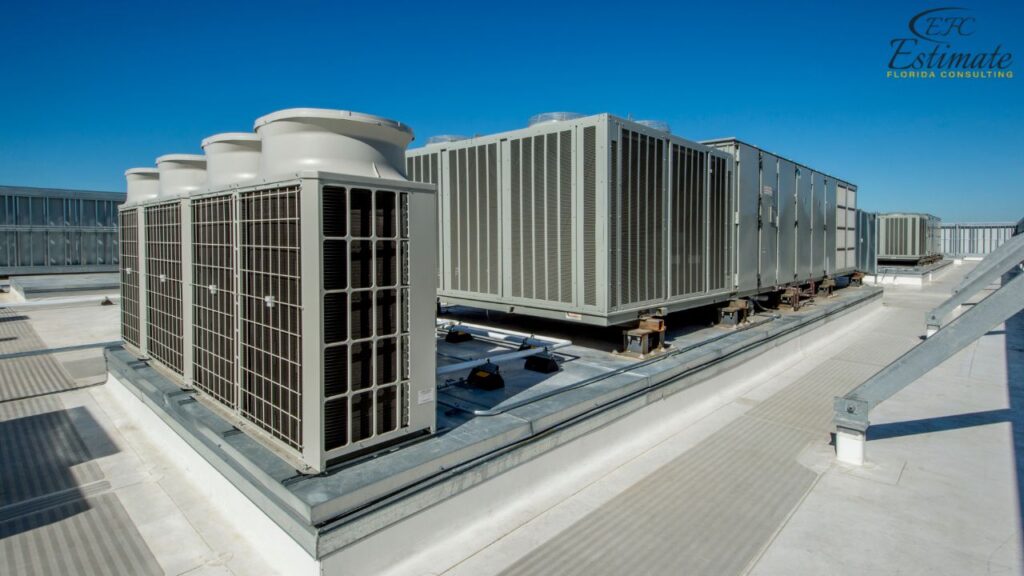
Components of Mechanical Systems in Buildings
HVAC Systems
HVAC systems are essential for maintaining comfortable indoor environments. They include heating, cooling, and ventilation components that regulate temperature and air quality. Estimating the costs for HVAC systems involves considering equipment, ductwork, insulation, and controls. The complexity of the system and the building’s size significantly impact the overall cost. Proper estimation ensures that the HVAC system not only meets regulatory requirements but also delivers optimal performance, enhancing the building’s energy efficiency and occupant comfort.
Plumbing Systems
Plumbing systems encompass water supply, drainage, and waste management. Estimating plumbing costs involves calculating expenses for pipes, fixtures, fittings, and labor. Factors such as building height, water pressure requirements, and local codes play a significant role in determining the total cost. Accurate estimation ensures that the plumbing system is both functional and compliant with all relevant standards, preventing costly reworks and ensuring long-term reliability.
Fire Protection Systems
Fire protection systems are critical for ensuring the safety of building occupants. These systems include sprinklers, fire alarms, and suppression systems. Estimating costs for fire protection involves considering equipment, installation, and maintenance. The building’s occupancy type and local fire safety regulations influence the overall cost. Proper cost estimation ensures that the fire protection system is robust and reliable, providing peace of mind and compliance with safety regulations.
Electrical Systems
Electrical systems provide power for lighting, appliances, and equipment. Estimating electrical costs involves calculating expenses for wiring, panels, outlets, and labor. Factors such as the building’s size, electrical load requirements, and complexity of the system affect the total cost. Accurate estimation ensures that the electrical system is safe, efficient, and capable of meeting the building’s power needs, minimizing the risk of outages and ensuring long-term reliability.
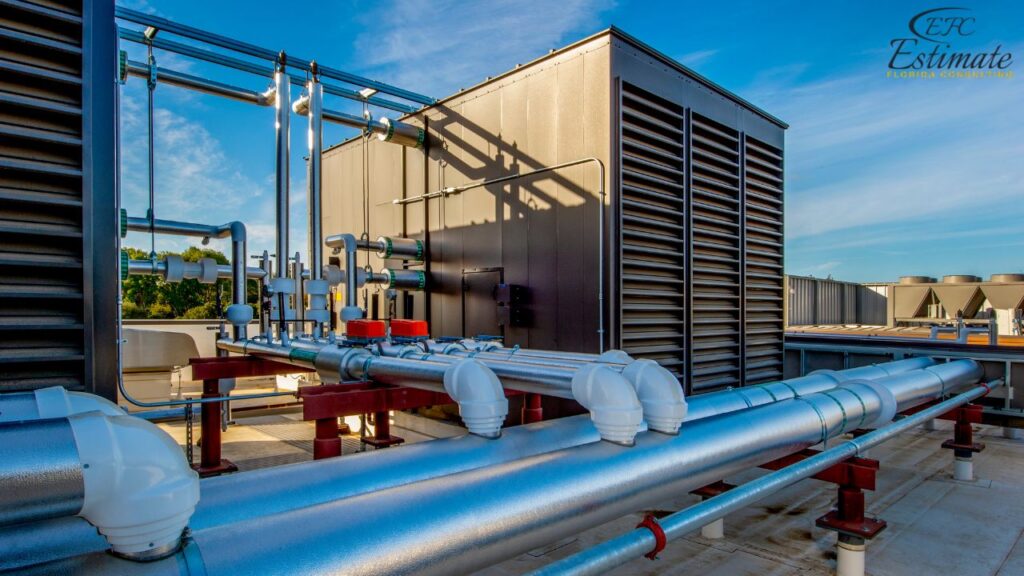
Factors Influencing Mechanical System Costs
Building Size and Type
The size and type of the building are primary factors influencing mechanical system costs. Larger buildings require more extensive systems, leading to higher costs. Additionally, different building types, such as commercial, residential, or industrial, have unique requirements that impact the overall expense. Understanding these requirements is essential for accurate cost estimation, ensuring that the mechanical systems are appropriately scaled and configured for the building’s specific needs.
System Complexity
The complexity of the mechanical systems significantly affects the cost. More advanced systems with sophisticated controls and automation features tend to be more expensive. Customization and integration with other building systems also add to the complexity and cost. Accurate estimation ensures that all aspects of system complexity are accounted for, providing a realistic budget that aligns with the project’s technical requirements.
Material Quality
The quality of materials used in mechanical systems plays a crucial role in determining costs. High-quality materials may have a higher upfront cost but often provide better performance and durability, leading to long-term savings. Choosing the right materials requires balancing initial costs with long-term benefits. Proper cost estimation ensures that material quality is factored into the budget, providing a realistic financial framework for making informed material choices.
Labor Costs
Labor costs are a significant component of mechanical system expenses. The availability of skilled labor, regional wage rates, and the complexity of the installation affect labor costs. Proper planning and scheduling can help optimize labor expenses and prevent cost overruns. Accurate estimation ensures that labor costs are fully accounted for, providing a realistic budget that reflects the true scope of work and the expertise required.
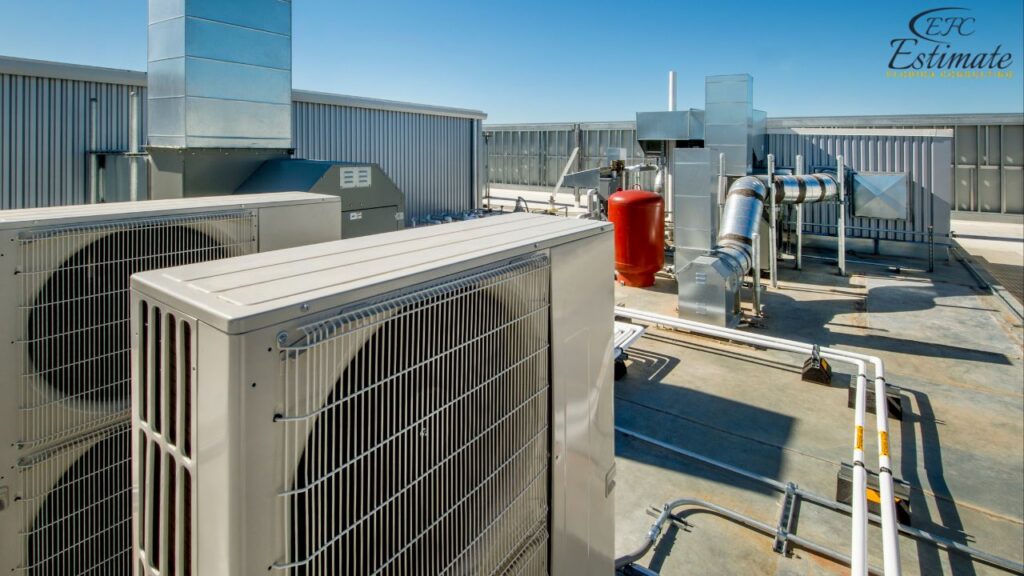
Average Mechanical System Costs for Commercial Buildings
Commercial buildings require extensive and more complex mechanical systems. Below is an overview of the average costs associated with HVAC, plumbing, and electrical systems in commercial buildings.
HVAC System Costs
- Standard HVAC: $15 to $30 per square foot.
- High-efficiency HVAC: $35 to $40 per square foot.
- Large Central Air Systems: For large commercial buildings like warehouses or office complexes, the cost ranges from $25,000 to $60,000.
HVAC Cost Table for Commercial Buildings:
Building Size (Sq Ft) | Standard HVAC System Cost | High-Efficiency HVAC Cost |
10,000 Sq Ft | $150,000 – $300,000 | $350,000 – $400,000 |
50,000 Sq Ft | $750,000 – $1,500,000 | $1,750,000 – $2,000,000 |
Plumbing System Costs
- Basic Plumbing Systems: $4 to $6 per square foot.
- Advanced Plumbing: Can go as high as $12 per square foot depending on system complexity.
- Custom or specialized installations: Gas lines or fire suppression systems can increase costs due to the need for specialized labor and materials.
Plumbing Cost Table for Commercial Buildings:
Building Size (Sq Ft) | Basic Plumbing System Cost | Advanced Plumbing Cost |
10,000 Sq Ft | $40,000 – $60,000 | $80,000 – $120,000 |
50,000 Sq Ft | $200,000 – $300,000 | $400,000 – $600,000 |
Electrical System Costs
- Basic Electrical Installations: $2 to $4 per square foot.
- Advanced Electrical Systems: $5 to $10 per square foot for custom lighting, security systems, and data infrastructure.
Electrical Cost Table for Commercial Buildings:
Building Size (Sq Ft) | Basic Electrical System Cost | Advanced Electrical Cost |
10,000 Sq Ft | $20,000 – $40,000 | $50,000 – $100,000 |
50,000 Sq Ft | $100,000 – $200,000 | $250,000 – $500,000 |
Benefits of Hiring a Professional Mechanical System Estimator
Accuracy and Efficiency
Professional estimators use advanced tools and their extensive knowledge to provide precise estimates. This accuracy helps in avoiding costly overruns and ensures that all aspects of the project are accounted for. Their proficiency in using software and databases to track costs and trends means you get an up-to-date and reliable estimate. Efficiency in their workflow also translates to faster turnaround times, allowing your project to progress without unnecessary delays. Accurate estimation ensures that your project stays on budget and on schedule, providing a solid foundation for successful project management.
Cost Savings
While hiring a professional may seem like an additional expense, it can actually save you money in the long run. Accurate estimates prevent overspending on materials and labor, and help in negotiating better deals with suppliers. Estimators often have established relationships with vendors and can leverage these connections to get discounts or favorable terms. Their expertise also helps in identifying areas where costs can be cut without compromising quality, maximizing your budget’s impact. By ensuring that every dollar is wisely spent, professional estimators help you achieve the best value for your investment.
Time Management
A professional estimator can save you time by quickly and efficiently compiling estimates. This allows you to focus on other important aspects of your project, ensuring that it progresses smoothly. Their streamlined processes and experience mean they can foresee and mitigate potential issues before they arise. By handling the complex task of cost estimation, they free up your time, allowing you to concentrate on design, coordination, and execution. Effective time management ensures that your project stays on track, meeting deadlines and milestones without unnecessary delays.
Qualities to Look for in a Mechanical System Estimator
Experience and Expertise
Look for estimators with a proven track record in mechanical system projects. Their experience will ensure that they can handle the specific requirements of your project. An estimator with a diverse portfolio demonstrates versatility and adaptability, crucial for tackling various challenges. Their expertise in different types of mechanical systems, from HVAC to electrical, ensures they can provide accurate estimates tailored to your needs. Experienced estimators bring a wealth of knowledge and insight, enhancing the overall quality and reliability of the estimation process.
Videos For Mechanical Work
HVAC Installation
HVAC Upgrade
HVAC Installation
Attention to Detail
An effective estimator pays close attention to every detail, ensuring that nothing is overlooked. This meticulous approach guarantees a comprehensive and accurate estimate. Details such as local building codes, permit requirements, and specific material specifications are all taken into account. This level of precision helps in avoiding costly surprises and ensures that your project complies with all regulations. Attention to detail ensures that every aspect of the project is thoroughly considered, providing a solid foundation for successful project execution.
Strong Communication Skills
Good communication is essential for understanding your project’s needs and conveying the estimate clearly. Choose someone who can explain complex information in a straightforward manner. Effective communication also means being able to listen to your concerns and adjust estimates accordingly. An estimator who can articulate their findings and recommendations clearly will ensure that you are well-informed and confident in your financial planning. Strong communication skills foster collaboration and understanding, enhancing the overall efficiency and effectiveness of the project.
Proven Track Record
Check for references and past work samples to gauge the estimator’s reliability and performance. A proven track record is a good indicator of their capability. Testimonials from previous clients and a portfolio of completed projects provide insight into their professionalism and success rate. An estimator with a solid reputation is more likely to deliver consistent and high-quality results. A proven track record demonstrates the estimator’s ability to meet client expectations and deliver successful outcomes.
Steps to Hire the Right Mechanical System Estimator
Define Your Project Scope
Clearly outline the specifics of your project, including size, complexity, and any unique requirements. This will help the estimator understand your needs better. Detailed project descriptions, blueprints, and specifications should be provided to ensure accurate estimations. Understanding the full scope allows the estimator to identify all potential costs and allocate resources appropriately. Defining your project scope provides a clear framework for the estimation process, ensuring that all aspects of the project are thoroughly considered.
Research and Shortlist Candidates
Look for estimators online, ask for recommendations, and compile a list of potential candidates. Check their websites and reviews to get an initial idea of their reputation and expertise. Consider reaching out to professional associations or industry groups for recommendations. A well-rounded list of candidates provides a broader perspective and increases your chances of finding the best fit. Researching and shortlisting candidates ensures that you have a diverse pool of qualified professionals to choose from.
Check Qualifications and Experience
Ensure that the candidates have the necessary qualifications and experience in mechanical system cost estimation. Look for certifications, training, and previous project experience. Verifying credentials ensures that you are hiring a qualified professional with the technical knowledge required for accurate estimations. Experience with similar projects is particularly valuable as it indicates familiarity with potential challenges and solutions. Checking qualifications and experience provides confidence in the estimator’s ability to deliver reliable and accurate results.
Request References and Past Work Samples
Ask for references from past clients and samples of previous work. This will give you a better understanding of their capability and reliability. Contacting references provides firsthand insight into the estimator’s performance, work ethic, and ability to meet deadlines. Reviewing past work samples allows you to assess the quality and thoroughness of their estimates. Requesting references and past work samples ensures that you have a comprehensive understanding of the estimator’s capabilities and performance history.
Conduct Interviews
Ask for references from past clients and samples of previous work. This will give you a better understanding of their capability a
Interview the shortlisted candidates to assess their skills and fit for your project. Ask about their estimation process, tools they use, and how they handle potential challenges. Interviews provide an opportunity to gauge their communication skills, professionalism, and ability to understand your project’s unique needs. Discussing hypothetical scenarios can also reveal their problem-solving abilities and approach to cost estimation. Conducting interviews ensures that you select an estimator who aligns with your project’s requirements and your working style.
nd reliability. Contacting references provides firsthand insight into the estimator’s performance, work ethic, and ability to meet deadlines. Reviewing past work samples allows you to assess the quality and thoroughness of their estimates. Requesting references and past work samples ensures that you have a comprehensive understanding of the estimator’s capabilities and performance history.
Discuss Costs and Payment Terms
Discuss the costs involved in hiring them and the payment terms. Ensure that there are no hidden fees and that you are comfortable with their pricing structure. Transparency in costs and payment terms helps in avoiding misunderstandings and ensures that both parties are on the same page. Clarifying payment schedules and terms upfront establishes a clear financial arrangement. Discussing costs and payment terms ensures that you have a mutual understanding of the financial aspects of the engagement.
Common Mistakes to Avoid When Hiring a Mechanical System Estimator
Overlooking Credentials
Always verify the credentials of the estimator to ensure they have the necessary skills and qualifications. Hiring someone without proper qualifications can lead to inaccurate estimates and potential project issues. Thoroughly vetting candidates’ backgrounds and certifications ensures that you are working with a competent professional. Overlooking credentials can result in hiring an estimator who lacks the expertise required for accurate and reliable cost estimation.
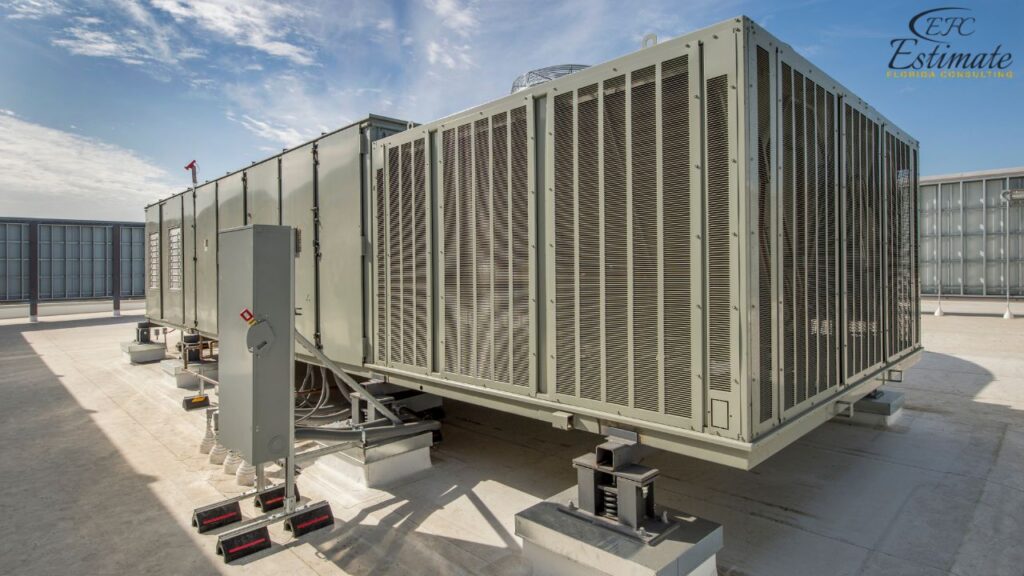
Ignoring References
References provide valuable insights into the estimator’s reliability and performance. Ignoring them can lead to hiring someone unsuitable for the job. Speaking with past clients offers a real-world perspective on the estimator’s capabilities and reliability. References can highlight strengths and potential areas of concern, helping you make an informed decision. Ignoring references can result in hiring an estimator who fails to meet your expectations or deliver the desired results.
Focusing Solely on Price
While cost is an important factor, it shouldn’t be the only consideration. Quality and reliability are equally important to ensure the success of your project. Choosing the cheapest option may result in poor quality work and additional costs down the line. Balancing cost with experience and reputation ensures that you get value for your investment. Focusing solely on price can lead to hiring an estimator who compromises on quality, ultimately costing you more in the long run.
The Role of Technology in Mechanical System Cost Estimation
Advanced Estimation Software
Professional estimators utilize advanced software tools to enhance the accuracy and efficiency of their cost estimates. These tools allow for detailed modeling and analysis, incorporating various cost factors and scenarios. By leveraging technology, estimators can provide more precise and comprehensive estimates, reducing the risk of errors and omissions. Advanced software also facilitates better communication and collaboration, enabling stakeholders to access and review estimates easily.
Real-Time Data Integration
Access to real-time data is crucial for accurate cost estimation. Estimators integrate real-time data on material costs, labor rates, and market trends to ensure their estimates reflect current conditions. This dynamic approach allows for adjustments based on fluctuations in the market, ensuring that the estimates remain relevant and accurate throughout the project lifecycle. Real-time data integration enhances the reliability and validity of the cost estimates, providing a solid foundation for financial planning and decision-making.
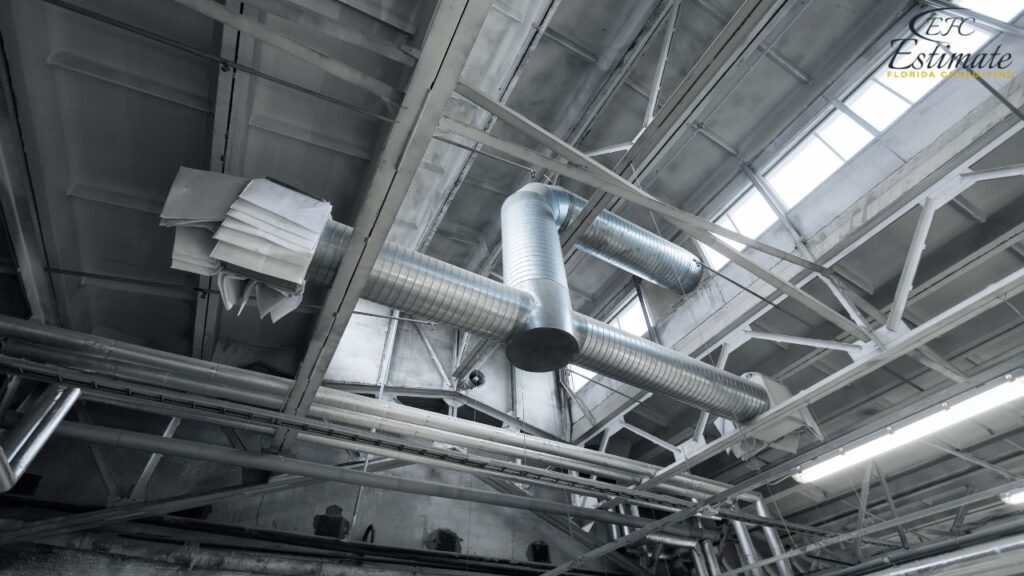
BIM (Building Information Modeling)
Building Information Modeling (BIM) is a powerful tool that integrates various aspects of a construction project into a single digital model. Estimators use BIM to create detailed and accurate cost estimates by visualizing the project’s components and their interactions. BIM facilitates better coordination and collaboration among different stakeholders, improving the overall efficiency and accuracy of the estimation process. By incorporating BIM into cost estimation, estimators can provide more accurate and comprehensive estimates that reflect the project’s complexity and requirements.
How to Estimate Mechanical System Costs for Your Building Project
Estimating mechanical system costs accurately is essential to keeping a project on track and within budget. Follow these steps for the best results:
1. Collaborate with Experts
Work with mechanical engineers, HVAC specialists, and electrical contractors early in the planning stage. Their expertise can help identify potential issues and suggest cost-saving measures that don’t sacrifice quality.
2. Use Historical Data for Benchmarking
Look at the costs of similar projects to create a realistic baseline for your estimates. This approach helps prevent underestimating expenses and missing key cost factors.
3. Factor in System Upgrades
Consider the full lifecycle cost of the system, not just the installation. Energy-efficient upgrades may be more expensive upfront but can result in long-term savings in utility and maintenance costs.
4. Budget for Contingencies
Include a contingency reserve of 10-15% to cover unexpected issues like design changes, unforeseen infrastructure challenges, or rising material costs.
How Estimate Florida Consulting Can Help?
Overview of Services
Estimate Florida Consulting offers comprehensive mechanical system cost estimation services for all types of projects. Their team of experienced professionals ensures accurate and detailed estimates, tailored to your specific needs. They provide a range of services from initial budgeting to final cost analysis, ensuring that every aspect of your project is financially covered. Their expertise spans various mechanical systems, including HVAC, plumbing, fire protection, and electrical, providing a holistic approach to cost estimation.
Download Template For Surveillance Cameras Project Breakdown
- Materials list updated to the zip code
- Fast delivery
- Data base of general contractors and sub-contractors
- Local estimators

Benefits of Choosing Estimate Florida Consulting
- Expertise: With years of experience, they bring unparalleled expertise to every project.
- Accuracy: Their precise estimates help in effective budgeting and planning.
- Efficiency: Quick turnaround times ensure that your project stays on schedule.
- Client Satisfaction: Numerous satisfied clients testify to their reliability and quality of service.
Conclusion
Hiring the right mechanical system cost estimator is crucial for the success of your construction or renovation project. By following the steps outlined in this article, you can ensure that you choose a qualified professional who will provide accurate and reliable estimates. Estimate Florida Consulting offers exceptional estimation services, making them a top choice for your mechanical system cost estimation needs.
FAQs
A mechanical system estimator calculates the total expenses for the mechanical components of a building project, including HVAC, plumbing, fire protection, and electrical systems. They provide detailed and accurate estimates to help in budgeting and planning.
The cost of hiring a mechanical system estimator varies based on the project’s size and complexity. Typically, estimators charge a fee or a percentage of the total project cost.
You can verify the credentials by checking their qualifications, certifications, and experience. Request references and review past work samples to ensure their reliability.
Estimate Florida Consulting offers expertise, accuracy, efficiency, and high client satisfaction. Their detailed and precise estimates help in effective budgeting and planning for mechanical system projects.
To get started with Estimate Florida Consulting, you can visit their website or contact them directly to discuss your project needs and request an estimate.
Google Reviews



Process To Get Mechanical System Cost Estimate Report
Here I am going to share some steps to get mechanical system cost estimate report.
-
You need to send your plan to us.
You can send us your plan on info@estimatorflorida.com
-
You receive a quote for your project.
Before starting your project, we send you a quote for your service. That quote will have detailed information about your project. Here you will get information about the size, difficulty, complexity and bid date when determining pricing.
-
Get Estimate Report
Our team will takeoff and estimate your project. When we deliver you’ll receive a PDF and an Excel file of your estimate. We can also offer construction lead generation services for the jobs you’d like to pursue further.

